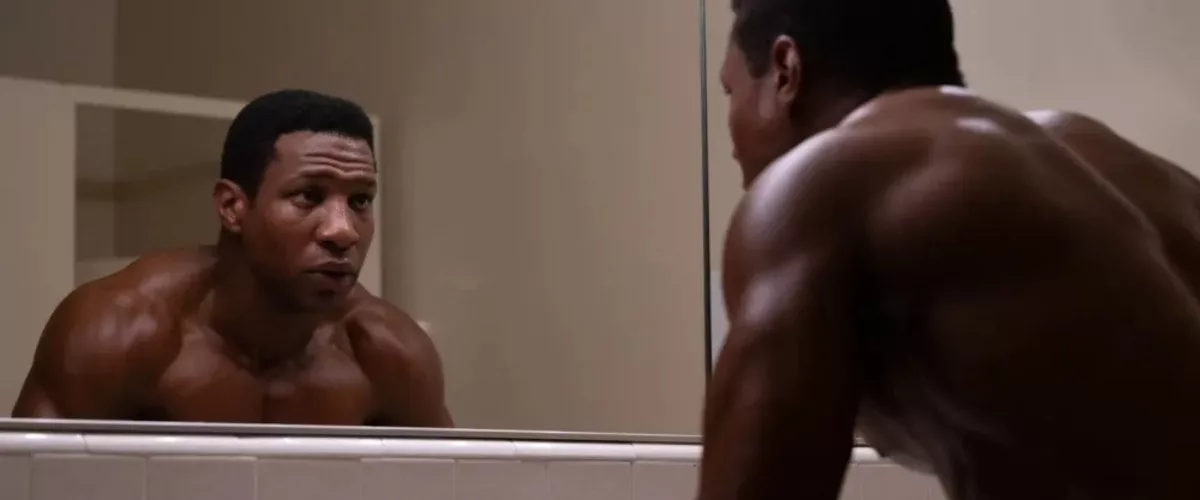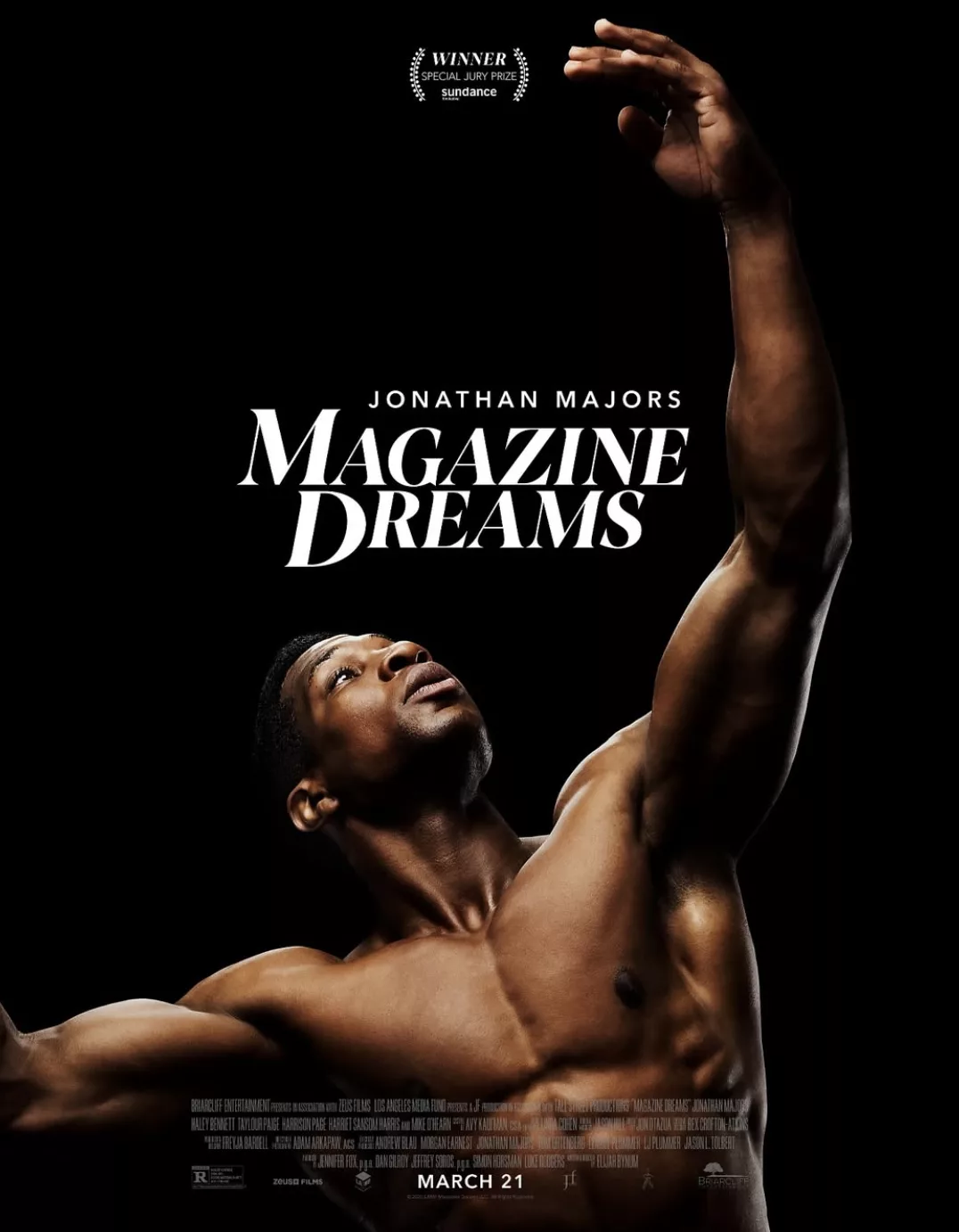“Magazine Dreams” is a dark drama in the vein of “Taxi Driver,” Martin Scorsese’s film about a disturbed cabbie named Travis Bickle who projects his damage onto the world. There have been a lot of movies in that mode, starting with 1970’s “Joe” (about a couple of reactionaries who hate hippies enough to murder them) and continuing through “Rolling Thunder,” “The Assassination of Richard Nixon,” “Chapter 27,” “I Shot Andy Warhol,” “The Fan,” “Big Fan,” “Down in the Valley” and “Drive.” The alienated loner in this one is an amateur bodybuilder named Killian Maddox (Jonathan Majors) who experienced a psyche-shattering incident of violence in his childhood and is also coping with probable mental illness, anger management issues, sexual dysfunction, economic hardship, a simmering hatred of people he thinks of as oppressors, and the burden of being a caregiver.
There are a few dream sequences in the film, but these don’t always immediately register as such, because writer-director Elijah Bynum and cinematographer Adam Arkapaw (“True Detective” Season 1) have lit and filmed Killian’s story in an expressionist neo-noir style. This, too, is “Taxi Driver”-esque. So are a firing range scene where the camera flies at the hero; scenes of Killian working out with weights and consuming massive amounts of food and steroids (echoing Travis preparing for urban warfare); and a sequence in which Killian invites his supermarket coworker on a date that he ruins just by being himself. There’s also narration in the form of Killian’s letters to a world-famous bodybuilder he’s obsessed with. And so on. The homages and borrowings—not just from Scorsese’s oeuvre but other widely-seen films, including a brazen lift from “Boogie Nights”—constrict the movie and prevent it from breathing on its own.
The other limiting (or complicating) factor comes from beyond the production: “Magazine Dreams” arrives in theaters two years after its leading man was accused of physical and emotional abuse by his then-girlfriend, who among other things claimed Majors strangled her, and a few days after an audio recording was released in which Majors seemingly admits to the crime. “Magazine Dreams” begins with shots of Killian caring for his grandfather Papaw (Harrison Page), a disabled Vietnam veteran, while a court-assigned counselor (Harriet Sansom Harris) speaks the film’s first two lines of dialogue as voice-over: “The state has mandated these sessions because they’re worried about your aggression. They want to see that you won’t cause harm to anyone.” Majors’ real-life run-ins with the law add an element of art/life entanglement that the movie isn’t strong enough to make you forget.
This is all too bad, because there are unique facets to “Magazine Dreams” that make it genuinely disturbing, and sometimes revelatory.
One is that, in contrast to all the other films I mentioned, the main character of “Magazine Dreams” is Black (as is the writer-director), and the script makes race a factor in Killian’s alienation—in ways that link it to one of the most important works of 20th century U.S. fiction, Richard Wright’s Native Son. Wright’s book is essentially a Black American answer to “Crime and Punishment” that gets into the social factors that go into forging its murderous antihero Bigger Thomas. Some of the passages in Wright’s novel might as well be describing Killian’s descent into degradation and bloodshed, including “Men can starve from a lack of self-realization as much as they can from a lack of bread” and “Violence is a personal necessity for the oppressed…It is not a strategy consciously devised. It is the deep, instinctive expression of a human being denied individuality.”
Neither Wright nor Bynum present any of this material as an excuse for Killian’s violence, but as a set of contextualizing facts to bear in mind as you watch, and that it would have been intellectually dishonest to ignore. Killian’s dialogue brings in justifiable grievances against the ruling majority, ones that all the white folks in the film probably wouldn’t think about, such as the fact that Killian and his father live in a “food desert” with other economically disadvantaged people, which means Killian has to drive six miles each way for groceries; and the way that the law tends to view young Black American men as guilty of something even when they’ve done nothing wrong, as when a squad car lights up and bleeps its sirens belligerently at Killian as he’s jogging at night while wearing a hoodie (shades of Trayvon Martin).
Later in the movie, at a diner, a physically and morally frayed Killian confronts a white man who led a trio that savagely beat him up in front of his father’s house. The man is eating with his wife and two young children, so the confrontation reads as “scary Black man terrorizes innocent white folks.” The beating was retaliation for Killian trashing a hardware store, which itself was retaliation for the store sending a painting crew that did an incompetent job on his father’s house and rudely laughed at the idea that they should come back over and do it right. The clientele of the diner doesn’t know this. They buy into the other guy’s “I’m just a regular dad trying to have a nice dinner with my family” routine and assume Killian is a hot-tempered, violent, probably insane Black man who’s making up ridiculous stories, rather than somebody caught up in a cycle of violence that has many villains but no heroes. I wish there were more scenes in the movie like this—a scene that shows you something you’ve never seen in this kind of movie, as opposed to a new version of a thing you’ve seen many times.
“Magazine Dreams” is also worth seeing for Majors’ performance. It’s extraordinary, to the point of elevating the entire movie, and giving it nuances that partly counteract the derivative nature of how the story is told. Majors reportedly took the part right after playing the antagonist in “Creed III,” which required him to sculpt a boxer’s physique (he gave another great performance in that one), and he took things even further, adding body mass by consuming huge amounts of protein and working out several hours a day. But this isn’t just a cliche exercise in actorly “transformation.” Majors adds hints of depth, complexity, and fragility to Killian that are recognizable from life, not just other movies.
Notice Killian’s furtive glances everywhere but at other people’s faces, as well as the awkward timing and lack of tonal control over verbal responses. There are hints that the character might be developmentally disabled, emotionally disturbed, on the spectrum (somewhere), brain-damaged by his masochistic workout routine or by previous violent incidents (an X-ray shows several bits of metal in his skull), or all of the above plus more. But Majors never underlines or oversimplifies Killian. He lets us see faint glimpses of answers, then lets us fill in the gaps with our imagination. That guarantees the character a baseline of sympathy even when he’s at his most monstrous. Imagine Bigger Thomas crossed with Frankenstein’s monster, fantasizing about winning the Mr. Universe competition.
Killian is the most haunting character Majors has played, and one of his finest performances overall, up there with his (very different) work in “The Last Black Man in San Francisco” and “The Harder They Fall.” That “Magazine Dreams” might contain the final screen performance by a troubled man who was on track to become an acting legend before self-destructing adds an unwanted extra layer to a movie that was stacked enough as it was. But people are complicated. So is life, and our relationship to art.




















